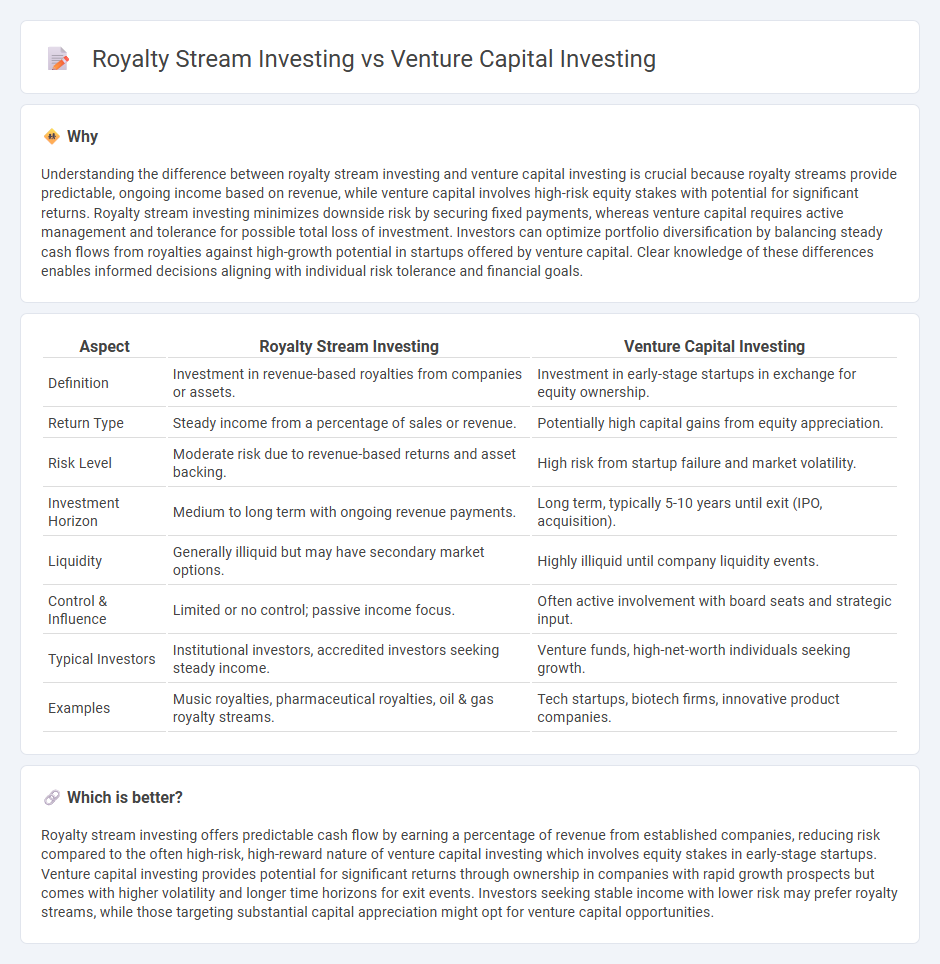
Royalty stream investing involves acquiring a percentage of revenue generated by a company's product, providing steady cash flow with lower risk compared to traditional equity stakes. Venture capital investing focuses on high-growth startups, offering potential for significant returns through equity ownership but comes with higher risk and longer exit horizons. Explore these investment strategies further to determine which aligns best with your financial goals and risk tolerance.
Why it is important
Understanding the difference between royalty stream investing and venture capital investing is crucial because royalty streams provide predictable, ongoing income based on revenue, while venture capital involves high-risk equity stakes with potential for significant returns. Royalty stream investing minimizes downside risk by securing fixed payments, whereas venture capital requires active management and tolerance for possible total loss of investment. Investors can optimize portfolio diversification by balancing steady cash flows from royalties against high-growth potential in startups offered by venture capital. Clear knowledge of these differences enables informed decisions aligning with individual risk tolerance and financial goals.
Comparison Table
| Aspect | Royalty Stream Investing | Venture Capital Investing |
|---|---|---|
| Definition | Investment in revenue-based royalties from companies or assets. | Investment in early-stage startups in exchange for equity ownership. |
| Return Type | Steady income from a percentage of sales or revenue. | Potentially high capital gains from equity appreciation. |
| Risk Level | Moderate risk due to revenue-based returns and asset backing. | High risk from startup failure and market volatility. |
| Investment Horizon | Medium to long term with ongoing revenue payments. | Long term, typically 5-10 years until exit (IPO, acquisition). |
| Liquidity | Generally illiquid but may have secondary market options. | Highly illiquid until company liquidity events. |
| Control & Influence | Limited or no control; passive income focus. | Often active involvement with board seats and strategic input. |
| Typical Investors | Institutional investors, accredited investors seeking steady income. | Venture funds, high-net-worth individuals seeking growth. |
| Examples | Music royalties, pharmaceutical royalties, oil & gas royalty streams. | Tech startups, biotech firms, innovative product companies. |
Which is better?
Royalty stream investing offers predictable cash flow by earning a percentage of revenue from established companies, reducing risk compared to the often high-risk, high-reward nature of venture capital investing which involves equity stakes in early-stage startups. Venture capital investing provides potential for significant returns through ownership in companies with rapid growth prospects but comes with higher volatility and longer time horizons for exit events. Investors seeking stable income with lower risk may prefer royalty streams, while those targeting substantial capital appreciation might opt for venture capital opportunities.
Connection
Royalty stream investing and venture capital investing are connected through their shared focus on funding high-growth companies with scalable business models. Royalty stream investing provides investors with ongoing revenue-based returns from a company's sales, aligning closely with venture capital's goal of fueling early-stage innovations that generate substantial long-term value. Both investment types leverage financial structures that balance risk and reward by capturing equity upside while preserving cash flow participation.
Key Terms
Equity ownership (Venture Capital)
Venture capital investing centers on acquiring equity ownership, granting investors partial control and potential high returns through company growth and exit events like IPOs or acquisitions. In contrast, royalty stream investing provides investors with a fixed percentage of revenue without ownership or control over the company. Explore the distinct benefits and risks of equity ownership versus royalty streams to optimize your investment strategy.
Royalties (Royalty Stream)
Royalty stream investing provides consistent income by acquiring a percentage of revenue generated from intellectual property, such as patents, trademarks, or natural resources, offering lower risk compared to traditional venture capital investing. Unlike equity stakes that depend on company growth and exit events, royalty streams deliver cash flow tied directly to product sales or licensing agreements, ensuring investors benefit regardless of company valuation fluctuations. Explore how royalty stream investing can diversify your portfolio and deliver stable returns in volatile markets.
Exit strategy (Venture Capital)
Venture capital investing typically relies on exit strategies such as initial public offerings (IPOs) or acquisitions to realize returns, with investors aiming for significant capital gains within a 5 to 10-year timeframe. These exits are often high-risk but offer the potential for exponential growth, making them attractive for investors seeking substantial upside. Explore more about how exit strategies shape venture capital investment outcomes.
Source and External Links
Venture Capital Funds: What they are & how to invest in them - Venture capital funds pool money from investors to finance early-stage startups with high growth potential, actively supporting their development with both capital and expertise, and typically exit through IPOs or acquisitions.
Venture Capital investing | Investment Strategies - Venture capital investing provides funding to startups in exchange for equity, targeting companies with significant growth prospects that may struggle to secure traditional financing due to their unproven nature.
What is Venture Capital? - Venture capital transforms innovative ideas into high-growth companies by providing long-term, high-risk equity investments and strategic support, often leading to job creation and major economic impact.
 dowidth.com
dowidth.com